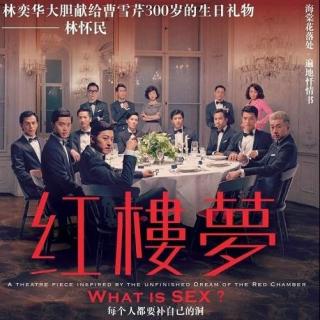
介绍:
(stage sound: theme song)
A Dream of Red Mansions is one of the Four Great Classical Novels in China. The epic novel depicting a tragic love story and the rise and fall of noble families by Chinese literature giant Cao Xueqin is still impacting Chinese culture today.
(stage sound: Opening song)
Now Hong Kong director Edward Lam, Lin Yihua, has created a revolutionary theater version.
Opening with an urban pop song in the 1960s and 70s, the story of A Dream of Red Mansions is now taking place in a modern club.
Director Edward Lam says good adaptation should be based on personal experiences.
"I began to read A Dream of Red Mansions when I was 15. I always wondered why it influenced me so much. I always think of the texts in the book, which somehow led my way of thinking. For me, to interpret and adapt a good story is like to digest it, and combine it with my personal life experience. Then when I share it with my audiences, they will get more information beyond the original text."
Since 2006, the veteran director has produced modern theater adaptations for all Four Great Classical Novels. He tries to rediscover such topics as the humanity, meanings of life and love in those classics through a modern perspective, and believes the strong resonation the classics have today makes them a valuable source of inspiration.
Lam says the goal of modern adaptation of literature classics is to intrigue the audience to think what is changing and what is not.
"A Dream of Red Mansions is about family. But people find it not much different from today. Why? I think because in a way, our culture is more collectivism-oriented, so generation after generation, people play basically the same role in family life. We live the way others believe is the best and rarely reflect on ourselves."
Apart from questioning the meanings of life and time, the play is also trying to use gender reversal to convey its message, with 12 lead male actors dressed in tuxedo playing the 12 key female figures in the novel.
Lam says he is inspired by the characters of the Chinese culture.
"No one is 100 percent masculine or 100 percent feminine. The whole Chinese nation is filled with female culture. The male part is something outside, so though it is hard to acknowledge, it is the female culture that takes the majority."
The lead figure in the play is an avant garde woman inspired by Wang Xifeng, one of the lead figures in the original novel. Lam says the career-minded, charismatic and ambitious woman represents the modern side of the story.
"Theater art is sometimes used for examining the past and estimating the future. I always think there is something that combines the elements of today and the future. Most theater plays are burdened with history. I think only by putting aside the past can we have a clearer vision of today and tomorrow."
The director says the value of A Dream of Red Mansions lies on its timelessness. People can always get something from the book as they get older. Lam says he hopes his play can make the same achievement.
(Theme music 似曾)
In fact, the play's theme song is designed to convey the same message, which is about the philosophy of the past and future.
Singer William Wei Li'an says he is going to present a song with high artistic value.
"The song has several blanks like those in traditional Chinese paintings, which leaves enough room for imagination. It is also not a rigid repetition for me. It makes me casual to enjoy each and every performance."
An increasing number of theatre goers are persuing avant-garde style. However, director Edward lam says modern Chinese theatre art still has a long way to go to find a perfect way to present the content.
"Many Chinese theatre arts only focus on the appearance or stick to nostalgia. But sometimes nostalgia is just an obstacle which prevents you from moving on. Sometimes the format seems to lead the trend of the future, but if you emphasizes too much on that, the spirit of the content will get lost."
For Edward Lam, what arts can provide people is something beyond the present, something more than solutions and answers. The process of artistic creation is not only to provide or give, it's also about sharing and communicating. The vetaran director says he will never stop experimenting modern theatre arts to insire people to pursue the better side of them.
(music end and fade out)
大家还在听

